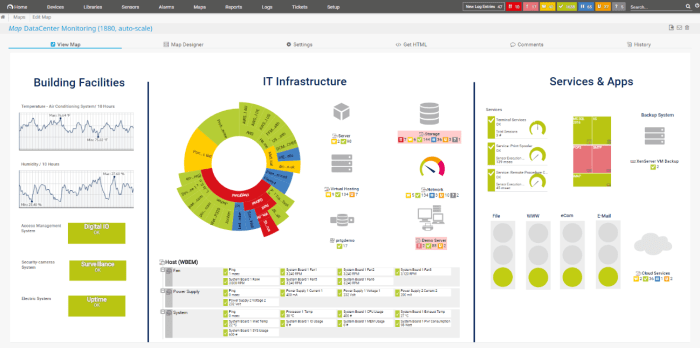Delving into the world of CIS professionals, the knowledge of essential software tools becomes paramount. This guide aims to shed light on the top tools that every CIS professional should be well-versed in, ensuring optimized productivity and efficiency in their daily tasks.
Overview of CIS Professional Tools
Software tools play a crucial role in the daily tasks of CIS professionals, helping them streamline processes, enhance security, and improve overall productivity.
Main Categories of CIS Professional Tools
- Network Monitoring Tools: These tools are essential for monitoring network performance, identifying potential issues, and ensuring the smooth operation of an organization's network infrastructure.
- Security Management Software: CIS professionals rely on security management software to protect sensitive data, detect and respond to cyber threats, and ensure compliance with regulations.
- Database Management Systems: Database management systems help CIS professionals store, organize, and retrieve data efficiently, ensuring data integrity and availability.
- Virtualization Software: Virtualization software allows CIS professionals to create virtual environments, optimize resource utilization, and enhance scalability within an organization's IT infrastructure.
How Software Tools Enhance Productivity
By leveraging these software tools, CIS professionals can automate repetitive tasks, reduce manual errors, collaborate effectively with team members, and make informed decisions based on real-time data. This leads to increased efficiency, reduced downtime, and improved overall performance in the workplace.
Programming Languages

Programming languages are essential tools for CIS professionals as they enable them to develop, maintain, and troubleshoot software systems. Proficiency in various programming languages allows CIS professionals to effectively communicate with computers and create solutions to complex problems.
Java
Java is a versatile and widely-used programming language in the field of CIS. It is known for its platform independence, making it suitable for developing applications that can run on different operating systems. Java is commonly used in enterprise-level applications and web development, making it a valuable skill for CIS professionals.
Python
Python is a high-level programming language known for its readability and simplicity. It is often used in data analysis, artificial intelligence, and web development. Python's extensive libraries and frameworks make it an ideal choice for rapid prototyping and automation tasks in the CIS domain.
C++
C++ is a powerful programming language commonly used in system programming, game development, and high-performance applications. It allows for low-level memory manipulation and efficient resource management, making it a preferred choice for performance-critical software projects in CIS.
SQL
Structured Query Language (SQL) is essential for managing and querying databases. CIS professionals often use SQL to retrieve, update, and manipulate data stored in relational databases. Proficiency in SQL is crucial for working with data-driven applications and ensuring data integrity in various CIS roles.
JavaScript
JavaScript is a popular programming language used for front-end web development. It enables CIS professionals to create interactive and dynamic user interfaces on websites. JavaScript is also commonly used in server-side development with Node.js, expanding its utility in full-stack development projects.
Comparison of Strengths and Weaknesses
Each programming language has its strengths and weaknesses that cater to different aspects of CIS roles. Java's portability and scalability make it ideal for large-scale enterprise applications, while Python's simplicity and versatility are well-suited for data analysis and AI projects.
C++'s performance optimization capabilities are valuable for resource-intensive applications, while JavaScript's ubiquity in web development ensures its relevance in front-end and back-end development tasks. SQL's specialization in database management is indispensable for CIS professionals working with data-driven applications.
Network Monitoring Tools
Network monitoring tools are essential for CIS professionals to ensure the security and performance of their networks.
Examples of Essential Network Monitoring Tools
- Wireshark: A popular tool for analyzing network traffic and detecting potential security threats.
- Nagios: A monitoring system that helps in identifying and resolving network issues before they affect performance.
- SolarWinds Network Performance Monitor: Provides real-time insights into network performance and helps in troubleshooting network problems.
How These Tools Help in Maintaining Network Security and Performance
Network monitoring tools play a crucial role in maintaining network security by detecting and preventing potential threats such as malware, unauthorized access, or unusual network activity. They also help in optimizing network performance by identifying bottlenecks, monitoring bandwidth usage, and ensuring smooth operation of network devices.
Features CIS Professionals Should Look For
- Real-time monitoring capabilities to detect issues as they occur.
- Alerting and notification systems to inform administrators of any anomalies or security breaches.
- Capacity to monitor multiple network devices and protocols for comprehensive coverage.
- Customizable dashboards and reports for easy analysis and troubleshooting.
Cybersecurity Software

As cybersecurity threats continue to evolve and become more sophisticated, the role of cybersecurity software in the arsenal of CIS professionals has never been more crucial. These software tools are essential for protecting sensitive data, networks, and systems from cyber attacks.
Key Cybersecurity Software Tools
- Antivirus Software: Programs like McAfee, Norton, and Kaspersky are essential for detecting and removing malware, viruses, and other malicious software from systems.
- Firewalls: Tools like Windows Firewall, Check Point, and Cisco ASA help monitor and control incoming and outgoing network traffic, acting as a barrier between internal networks and external threats.
- Encryption Tools: Software such as BitLocker and VeraCrypt help secure data by encrypting it, making it unreadable without the correct decryption key.
- Intrusion Detection Systems (IDS) and Intrusion Prevention Systems (IPS): Tools like Snort and Cisco Firepower provide real-time monitoring, detection, and prevention of malicious activities on networks.
- Vulnerability Assessment Tools: Programs like Nessus and QualysGuard help identify and prioritize security vulnerabilities in systems and networks, allowing CIS professionals to take proactive measures to mitigate risks.
By familiarizing themselves with these cybersecurity software tools, CIS professionals can enhance their ability to safeguard critical infrastructure and data from cyber threats
.
Database Management Systems
Database management systems (DBMS) are crucial tools for CIS professionals in organizing, storing, and managing data for organizations. These systems provide a structured way to handle large volumes of data efficiently and securely.
Top Database Management Systems
- MySQL: A popular open-source relational database management system known for its ease of use and scalability.
- Oracle Database: A robust and widely used database management system that is known for its reliability and performance.
- Microsoft SQL Server: A powerful database management system developed by Microsoft, commonly used in enterprise environments.
- PostgreSQL: An advanced open-source relational database management system that offers features such as extensibility and support for JSON.
- MongoDB: A leading NoSQL database management system that is ideal for handling unstructured data and real-time applications.
Role of Database Management Systems
Database management systems play a crucial role in handling data for organizations by providing the following functions:
- Data organization: DBMS help in structuring data in a way that is easy to retrieve, update, and manage.
- Data security: These systems ensure data integrity and protect sensitive information through access control and encryption.
- Data retrieval: DBMS enable users to retrieve specific data quickly and efficiently using query languages.
- Data scalability: Organizations can easily scale their databases as data volumes grow, ensuring optimal performance.
Scenarios for Different Database Management Systems
- MySQL:Ideal for small to medium-sized businesses looking for a cost-effective and user-friendly database solution.
- Oracle Database:Well-suited for large enterprises with complex data requirements and high transaction volumes.
- Microsoft SQL Server:Commonly used in Windows environments and preferred for its integration with other Microsoft products.
- PostgreSQL:Suitable for organizations requiring advanced features, extensibility, and support for a wide range of data types.
- MongoDB:Recommended for applications that deal with unstructured or semi-structured data, such as social media platforms and IoT devices.
Cloud Computing Platforms
Cloud computing platforms play a crucial role in the field of CIS (Computer Information Systems) by providing scalable and flexible solutions for managing resources, applications, and data. These platforms offer on-demand access to a variety of services, allowing CIS professionals to optimize their operations and enhance efficiency.
Popular Cloud Computing Platforms and Features
There are several popular cloud computing platforms available in the market, each offering unique features and capabilities. Here are some of the most widely used platforms:
- Amazon Web Services (AWS):AWS is one of the leading cloud platforms, offering a wide range of services including computing power, storage, and databases. It is known for its scalability, reliability, and global presence.
- Microsoft Azure:Azure is another prominent cloud platform that provides a variety of services for building, deploying, and managing applications. It offers integration with Microsoft products and services, making it a popular choice for organizations using Microsoft technologies.
- Google Cloud Platform (GCP):GCP offers a comprehensive set of cloud services, including computing, storage, and machine learning. It is known for its data analytics and AI capabilities, making it suitable for organizations with advanced technology needs.
Leveraging Cloud Computing for Scalability and Flexibility
CIS professionals can leverage cloud computing platforms to achieve scalability and flexibility in their operations. By utilizing cloud services, organizations can easily scale resources up or down based on demand, allowing for efficient resource allocation and cost optimization. Additionally, cloud platforms offer flexibility in terms of deploying and managing applications, enabling CIS professionals to adapt to changing business requirements quickly.
Collaboration Tools
Collaboration tools are essential for CIS professionals to effectively work with teams, streamline communication, and manage projects efficiently. These tools enable seamless collaboration regardless of physical location, ensuring that team members can work together in real-time.
Essential Collaboration Tools
- Slack: A popular messaging app that allows for team communication through channels, direct messages, and file sharing.
- Trello: A project management tool that uses boards, lists, and cards to organize tasks and track progress.
- Google Workspace: Provides a suite of productivity tools like Google Docs, Sheets, and Drive for real-time collaboration on documents.
- Zoom: Video conferencing software for virtual meetings, webinars, and screen sharing.
How Collaboration Tools Facilitate Communication and Project Management
Collaboration tools streamline communication by centralizing discussions, updates, and file sharing in one platform. They enhance project management by enabling task assignment, tracking progress, setting deadlines, and maintaining transparency among team members.
Best Practices for Integrating Collaboration Tools
- Establish clear communication guidelines and protocols for tool usage within the team.
- Provide training and support to ensure all team members are proficient in using the collaboration tools effectively.
- Integrate collaboration tools into existing workflows to enhance productivity and streamline processes.
- Regularly review and optimize the use of collaboration tools to ensure they meet the evolving needs of the team.
Concluding Remarks
In conclusion, mastering the use of top software tools is crucial for CIS professionals to thrive in their roles. By harnessing the power of these tools, professionals can navigate the complexities of the digital landscape with ease and precision.
FAQ Summary
What are some examples of essential network monitoring tools?
Examples include Nagios, SolarWinds, and PRTG Network Monitor.
Which programming languages are considered crucial for CIS professionals?
Commonly used programming languages include Python, Java, and SQL.
How can cloud computing platforms benefit CIS professionals?
Cloud platforms offer scalability, flexibility, and cost-efficiency for CIS professionals.



